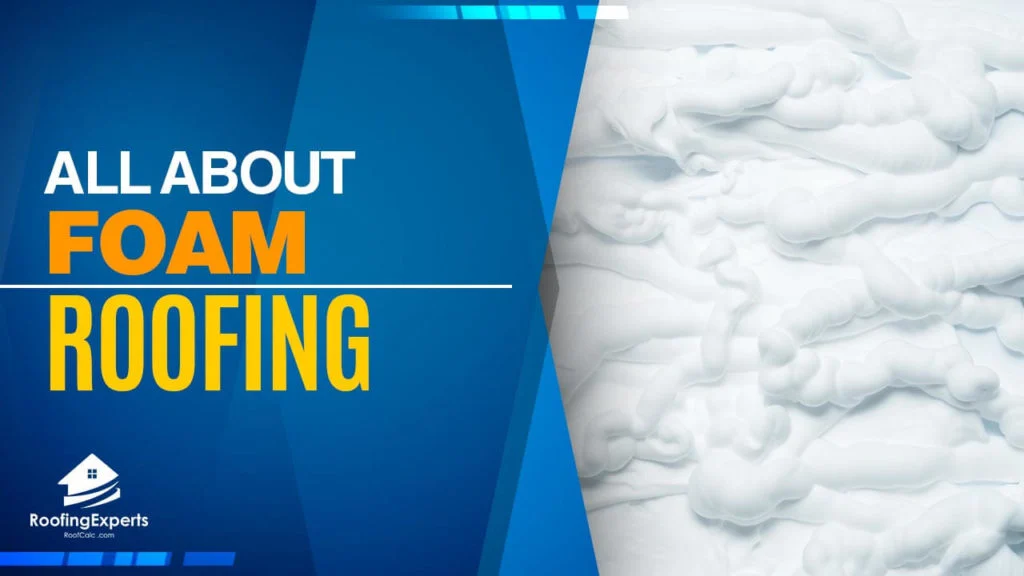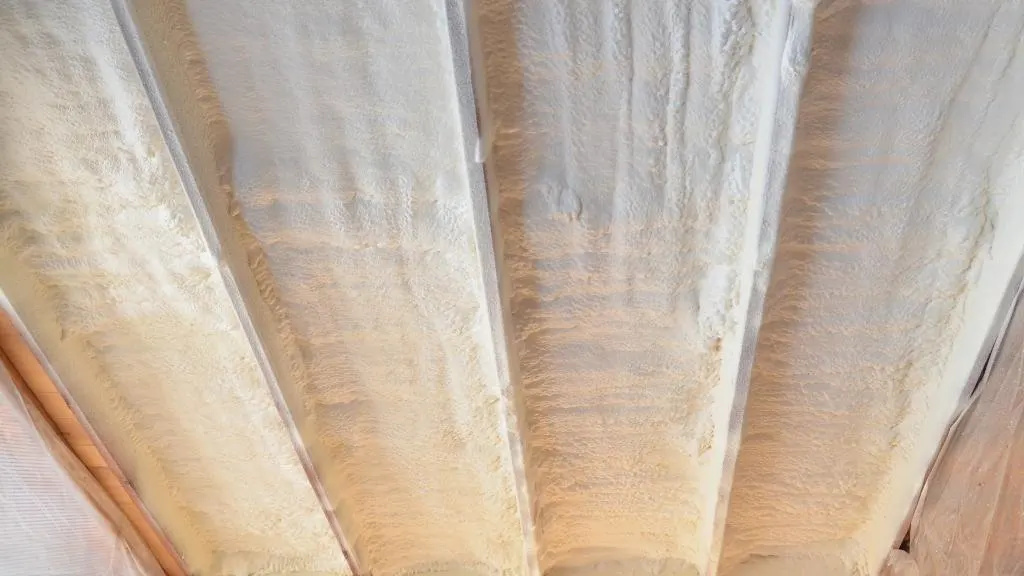
Spray polyurethane foam roofing, or spray-foam roofs provide a permanent solution for the problem of shingle failure. This type of material is applied as a liquid and then expands into an elastic layer across your existing roof until it becomes sturdy enough to withstand any weather conditions you can imagine!
It can provide benefits such as soundproofing and protection from leaks, but it might not be right for every situation.
In this blog post, we’ll look at some pros and cons of spray foam roofing so you can decide if it’s right for you!
Why is Spray Foam Roofing Used Today?
Spray foam roofing is known today because it is a very effective way to insulate and weatherproof a building. It can be used on new construction or on existing buildings, and it is an especially good choice for buildings that are in cold climates or that have a lot of exposed metal.
There are a few different types of foam, each of which has different advantages and disadvantages.
The variety of materials available when it comes to making your foam board for spray foam roofing can be confusing. There are many different types, including polyurethane foam, polystyrene foam, and polyisocyanurate foam.
Polyurethane Foam
There are two primary types of polyurethane foam on the market today, open cell and closed cell. Open-cell foam is soft to the touch (although it feels like regular roofing insulation on your roof), while the closed-cell foam is harder than rubber.
Closed-cell foam provides the best insulation of the roof because there are no air pockets. It is also completely waterproof, which makes it a great choice if you live in an area where it rains often or if your roof tends to hold water after storms. The downside to closed-cell foam is that because it contains no air, it can’t easily add insulation.
Open-cell foam is more effective at adding insulation than closed-cell foam, so it’s a good choice for roofs that have been exposed to the elements. It also provides a bit of insulation even when there are gaps in it because it traps some air even though it doesn’t keep out water. The downside to open-cell foam is that it is not waterproof.
Polystyrene Foam
Polystyrene foam is a more affordable option than polyurethane foam, and it is the most commonly used type of insulation. It comes in two varieties, extruded and expanded.
Extruded polystyrene is the most common type of insulation because it is cheap and easy to produce. It is also lightweight and can be easily cut and shaped. However, it is not very effective at insulating and does not hold up well in the weather.
Expanded polystyrene is a better choice for insulation because it has a higher R-value (the measure of how effective insulation material is at preventing heat transfer). It is also more durable than extruded polystyrene, but it is heavier and more difficult to work with.
Polyisocyanurate Foam
Polyisocyanurate foam is the most expensive type of foam, but it also has the highest R-value. It is made of two materials, polyurethane and polyisocyanurate, which gives it its high insulation value. It is also more durable than other types of foam.
However, it’s important to note that this type of insulation is not recommended for outdoor use because it can be flammable. If you are considering including polyisocyanurate foam in your spray foam roofing project, make sure you also plan to include fire breaks or an ignition barrier.
Now that you know a little bit more about the different types of foam, you can choose the best one for your project.
Pros of Spray Foam Roofing
There are many advantages of using spray foam roofing. Some of the pros include:
1) Sealing leaks – One of the main benefits of spray foam is that it can seal leaks and stop moisture infiltration. This is especially important in cold climates, where ice damming can occur and lead to water damage.
2) Insulation – Spray foam is an excellent insulator, which can help reduce heating and cooling costs.
3) Durability – Spray foam roofs are very durable and can last for many years.
4) Weight – Spray foam is a lightweight material, which makes it easier to install than traditional roofing materials.
5) Environmental friendly – Spray foam is a green product that is made from recycled materials. It is also non-toxic and does not produce any harmful fumes.
Cons of Spray Foam Roofing
There are a few potential drawbacks to using spray foam roofing:
1) Cost – Spray foam can be more expensive than other roofing materials.
2) Cleanup – Cleaning up during and after installation can be a bit more challenging since the small beads of foam will stick to everything.
3) Appearance – Some people do not like the appearance of an orange peel texture on the roof.
More information about spray foam roofing…
The cost of spray foam roofs varies depending on which type is used, the thickness of the coat, how much surface preparation needs to be done and which contractor you hire.
A good way to find out more information about spray foam roofing is by finding a local contractor with experience in this area. It’s recommended that you ask for references and speak with previous customers before hiring an experienced spray foam roofer.
There are many pros to using spray foam roofing, such as the sealant ability which prevents moisture infiltration and the insulation ability which reduces heating and cooling costs. Additionally, spray foam roofs are environmentally friendly and durable. There are a few potential cons like the higher cost and cleanup difficulty, but overall spray foam is a great choice for flat roofs.
How to Know if You Need Spray Foam Roofing
Most business owners and homeowners know the importance of having a solid roofing system in place to protect their property from the elements. If you’re unsure if spray foam is the right roofing solution for you, ask yourself the following questions:
1. Is my roof leaking?
2. Do I have an existing insulation system?
3. Do I need to stop air leakage?
4. Would an added layer of insulation make sense for my home or business?
If you responded yes to any of these questions, it is time to consider spray foam roofing solutions. A professional contractor will be able to advise you on the best solution for your needs and budget.
If you’re still on the fence about whether or not to invest in a spray foam roof, consider some of the benefits:
1. Increased energy efficiency – A properly installed spray foam roof will create an airtight seal, preventing unwanted heat loss in the winter and heat gain in the summer. This will help you save money on heating and cooling costs while ensuring that your business or home stays comfortable.
2. Fire protection – One of the biggest challenges for any homeowner or business owner is preventing a potentially damaging fire from reaching their roof and the beams inside the building’s structure. Spray foam has been rigorously tested by Underwriters Laboratories (UL), an independent testing organization, and is proven to lessen a fire’s intensity. In addition, it can also resist flame spread.
3. A need for size – Spray foam insulation is ideal when cavity spaces are too small or irregularly shaped for traditional insulation materials to properly fit in. It will expand up to 100 times its liquid volume at room temperature to fill in any gaps and provide a complete seal.
4. Moisture resistance – Spray foam insulation is also water-resistant, which is important for areas where there is a high risk of moisture damage, such as in coastal regions.
5. Mold and mildew prevention – One of the main benefits of spray foam roofing is that it helps to prevent moisture accumulation, which can lead to mold and mildew growth.
If you’re still not sure if spray foam roofing is the right solution for you, talk to a professional contractor. They will be able to assess your property and needs and provide you with a detailed estimate for the cost of the project.
What is the Lifespan of Spray Foam?
When properly installed, closed-cell spray foam has a lifespan of somewhere between 40 and 50 years. It is always recommended to use quality materials to ensure that you get the full life cycle out of your system.
How Long Does Spray Foam Insulation Last?
The answer varies greatly depending on several factors:
- Manufacturer (quality and material composition)
- Installation (type of tool used and skill of installer)
- Exposure & Environment (proper flash-point, moisture exposure, etc.)
Although you can expect the product to perform well for over 40 years in most cases, it is hard to say exactly “how long” since there are many factors that go into a long-lasting installation.
As you can see, the lifespan of spray foam insulation is affected by a number of factors. For the best results, it is important to use a quality product from a reputable manufacturer and to have a skilled installer do the job. With proper care, your spray foam insulation can provide years of reliable service.
How is Spray Foam Roofing Installed?
The installation of spray foam roofing is straightforward.
- The first step is to clean the surface of the roof and make sure it is free from any debris or obstructions.
- Next, the insulation is installed in a layer that is about 2 inches thick.
- After the insulation is in place, the foam is sprayed on top. The foam is allowed to cure for a few hours before the roof is deemed safe for use.
Spray foam roofing is one of the most popular types of roofing systems available today. It is affordable, durable, and easy to install. In addition, it can be used on a variety of different surfaces, including metal, asphalt, and concrete.
This makes it incredibly versatile and allows homeowners to use the same system for multiple different roofs.
And yet, one of the most common complaints that people have when it comes to spray foam roofing is that they are unsure of how it is installed. Are you among these people?
Conclusion
When it comes to spray foam insulation, the key is quality. In order to get a high-performing system that will provide years of reliable service, you need to choose your materials carefully and work with a team of professionals who know what they are doing. Spray foam can be a great choice for your home, but only if it is installed and maintained properly.


